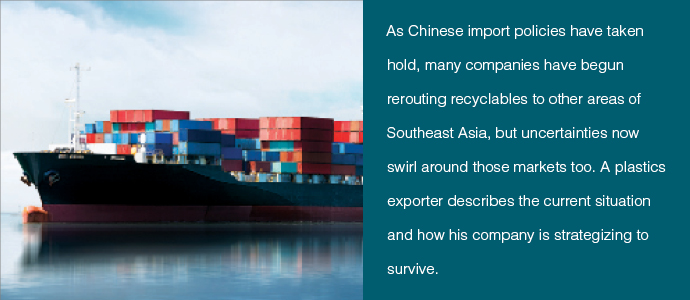
This article originally appeared in the Summer 2018 issue of Plastics Recycling Update. Subscribe today for access to all print content.
Many exporters of recovered plastics have increased the volume they send to Southeast Asia this year in an effort to fill the void left by China.
But recently, that strategy has become tenuous as well: Government officials and shipping lines have made a number of announcements indicating tighter import controls for recovered plastic and paper are possible in different areas of Southeast Asia. In Malaysia, Thailand and Vietnam, restrictions and increased regulation have already begun to take effect.
To get a better idea of the on-the-ground impact of these announcements for exporters of recovered material, Plastics Recycling Update spoke with Pablo Leon, Asia manager for Fosimpe S.L., a major Spanish broker of recovered plastics.
The interview with Leon took place in early June. What follows is an edited transcript of the conversation
Plastics Recycling Update: How has Southeast Asia played into Fosimpe’s export strategy?
Pablo Leon: By February of this year, we were starting to shift to some Southeast Asian countries. We already had some partners there that were taking our materials, but not big quantities before everything in China happened. To keep developing these relationships, we began to ship more materials there. It was mostly the good-quality [material] because after what happened in China it was very difficult to find an outlet for the lower grades.
They started taking these. Most of our partners had bought more machines from their equipment suppliers so that they could process more, because they knew that it was a good opportunity for them. Southeast Asia looked like the natural destination, because it’s close to China – the demand for pellets is still in China, because most of the marketers of finished products are still there.
In this area they all have free trade agreements with China, so for the Chinese it was cheaper to buy pellets from there than from Europe or the U.S. That’s one of the most important things: If they buy the pellets from Europe or from the U.S. directly, then they need to pay import tax.
We started shipping big volumes. We also saw some Chinese recyclers that opened facilities in Southeast Asian countries – mostly in Malaysia, Thailand and Vietnam. We have been shipping big volumes for a few months, and we even shipped more than before because these factories enlarged their capacities so they could handle very big volumes. And then, they started having some problems in Vietnam.
When did you start hearing about these problems, and what were they at first? Was it ports filling up at capacity?
Actually, it was mostly that the Vietnamese government canceled some import licenses. I don’t know the exact reason why it happened. My clients there, they told me that suddenly they were canceled and the Vietnamese government was performing checks on most of the import licenses.

Pablo Leon of Spanish exporter Fosimpe S.L. said his company has had to work hard to keep up with shifts in Vietnam and other countries.
That was around the Vietnamese New Year (mid-February) and that’s when everything started to be delayed in Vietnam. The government was checking the import licenses and companies couldn’t get the customs clearance for their containers, so then containers started to pile up in the ports. And Vietnamese ports, same as all Southeast Asian ports, they are not so big. They are not like in China. So they started to become congested.
The Vietnamese government issued import permits after that, or they renewed the current ones, but it was too late. And there were fewer import licenses than before. So the situation has not gotten any better, even though most of the containers that were stuck at the port in February have been cleared already.
Now, the processing time at the Vietnamese ports is much longer than before. Some terminals in Vietnam have stopped receiving plastic scrap, and we don’t know how the situation is going to be in the future.
Vietnam has been recycling plastic since much earlier than this, so I’m not so sure if they just want to get rid of this, which wouldn’t make much sense since they already have the industry, or if they are trying to regulate it.
How have the shipping companies responded to this situation?
When this started happening, a few shipping lines stopped taking any bookings for plastic scrap for Vietnam. From Europe, there are no shipping lines taking any bookings to Vietnam – even if the customer has an import license. Some of our customers still have an import license but we cannot ship the containers in.
Right now, we are mostly exporting everything to Malaysia and Thailand, and also to Indonesia.
We’ve been hearing about possible restrictions in those countries as well.
We heard about these rumors [in Mid-May]. There was a raid by the police in Thailand. They did some inspection of an e-waste processor in Thailand. They said that they found some plastic garbage that cannot be recycled, and then they posted a photo of decent LDPE film in bales, which can totally be recycled.
These countries, they don’t have the experience that China has. Even the authorities, the customs officers or the environmental department, they don’t really have the experience, as they do in China, to tell which material is good, which material is bad, how to recycle it.
I mean, the Chinese government made a decision. It can be judged in many different ways. But at least they knew the materials, they knew what they were doing and the goals they wanted to reach. But in these Southeast Asian countries, they don’t have as much experience, so I’m not sure how they are going to regulate it. They just label everything as “foreign garbage,” which is a very fashionable term. I hope that at least they get some accurate information.
Do you have an idea of what you’ll do if many places in Southeast Asia restrict imports severely?
We have a few ideas, but for now we’re keeping with Southeast Asia, because these are markets we have been developing for a few years already. As long as we can ship material there, we will keep doing it.
But of course, we know that we need to be open to new possibilities, and that the regulations and markets have been changing so fast in the last 12 months. So we know that we have to be very flexible and start looking for more alternatives. But we haven’t made any final decisions.
Chinese companies have invested in Southeast Asia to bring their pelletizing operations there. How worried are they about these developments?
It’s a difficult moment for them. I talk to a few of them, and they’re not really sure what’s going to happen, because everything is happening fast.
Most of the countries that we work with, they have also started doing recycling in their domestic market. In Vietnam and Malaysia, they are also trying to get materials from there, but of course it’s not enough. They need more materials from other countries in order to make the factories profitable and in order to keep them running.
Colin Staub is a staff writer for Plastics Recycling Update. He can be contacted at [email protected].

